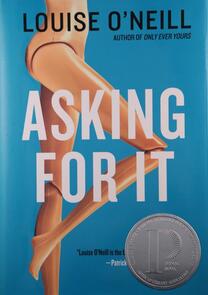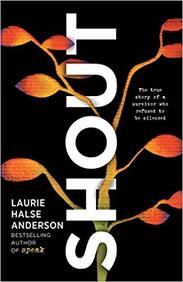Rape Culture and Diet Culture As Explored in Recent YA Novels
“Where there is power, there is also resistance.” --Michel Foucault
In Asking For It (2016), the eighteen-year-old main character Emma experiences gang rape at a friend’s party. While getting ready for the party at which the novel’s pivotal incidents occur, Emma conveys thoughts about food that are unhealthy. Her brother says, “Is that all you’re going to eat? Mam left dinner for us.” Her response is, “eating is cheating” (p. 55). Her brother Bryan laughs off the comment, but later, he becomes eerily aware at how body obsession eventually comes to harm his younger sister. As feminist scholar Susan Bordo (1993) noted, “feminism imagined the human body as itself a politically inscribed entity, its physiology and morphology shaped by histories and practice of containment and control,” which manifests in such areas as corseting to shrink the size of the human body, rape, and unwanted pregnancy (p. 21). Slut shaming and fat shaming are both aspects of social control that are imposed upon women to maintain the status quo of male dominance. One cultural message that many women get is that we must remain small, not only in our physical bodies, but also in our ability to assert ourselves and to speak up when we are being mistreated. The quote “eating is cheating” shows that Emma has gained messages about discipline of the body in a punishing tone, akin to Marx and Foucault’s ideas on the “‘direct grip’ that culture has on our bodies” (Bordo, 1993, p. 16).
Like Asking for It, Shout (2019) references the pressure for women to stay small through thinness. In the poem entitled “hippos,” the speaker notes that paralleling the magazine covers “of skeletal white privilege like the Kennedys” her parents “smothered/my hunger/by pinching my hips/grabbing the fat under my chin” starting when she was only eight, all the way through her twenties (p. 29). They called her Baby Hippo in an “insult disguised as love” and warned her that people would make fun of her “for being fat/so I might as well/get used to it” (p. 29). Scarring insults related to the body, which most women face at some point, can lead to negative feelings about the body. When the speaker was first raped, she did not tell anyone about it, perhaps in part due to the language surrounding shame she experienced as related to her body throughout her childhood.
Interestingly enough, this scene in Shout also points to the issue of privilege and weight. The Kennedy’s were able to embody the image of beauty in part because of their social capital and socioeconomic privilege. The speaker’s family was not well off, yet they were trying to uphold the media images of attractiveness. The parents’ possibly well-intentioned, but misguided encouragement of the speaker to look more like media images led her to feel disempowered in her own body, and media images and societal pressures have this impact on many women. Various forms of media serve as ideological state apparatuses that pressure women to uphold smaller physical appearances and demure demeanors. Although social media did not exist in the 1970s, television and written magazines contained advertisements that exerted the same pressure over women that social media now exerts on us today: We have an image to uphold, one that pleases the male gaze.
1. Moxie by Jennifer Mathieu
2. 52 Likes by Medeia Sharif
3. Sadie by Courtney Summers (also, All the Rage by the same author)
4. The Nowhere Girls by Amy Reed
5. Speak: The Graphic Novel by Laurie Halse Anderson and Emily Carroll
6. Sold by Patricia McCormick
7. The Female of the Species by Mindy McGinnis
8. Go Ask Alice by Beatrice Sparks (Anonymous)
9. The Lovely Bones by Alice Sebold
10. Just Listen by Sarah Dessen
11. The Gospel of Winter by Brendan Kiely
12. The Strange and Beautiful Sorrows of Ava Lavender by Leslye Walton
References
investigation). In Louis Althusser, Lenin and philosophy and other essays (Ben Brewster,
Trans.) (pp. 127-186). New York: Monthly Review Press. (Reprinted from La Pensée,
1970).
Anderson, L.H. (2019). Shout (Advanced Readers’ Edition). New York, NY: Viking.
Bordo, S. (1993/2003). Unbearable Weight: Feminism, Western Culture, and the Body.
Berkely, CA: University of California Press.
O’Neill, L. (2016). Asking for It. New York, NY: Quercus.



 RSS Feed
RSS Feed